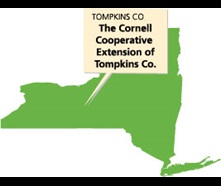
Population: 104,871
Project focus: Access to foods that support healthy eating patterns
Goals:
- Depict, define, and critique (strengths and limitations) the current food system in Tompkins County to identify assets for and barriers to childhood food security, and to review the current approaches being used to improve food security
- Formally align the CNC with other Tompkins County food systems initiatives to better inform change and influence sustainability through policy, systems and environmental change
- Influence systems change that has the potential to increase food security for every young person pre-birth to age 24 in Tompkins County, with a focus on food sovereignty, people’s right to healthy and culturally appropriate food, produced through ecologically sound and sustainable methods, and their right to define their own food and agriculture systems
Approaches and Partners
The Childhood Nutrition Collaborative, a community coalition of Cornell Cooperative Extension of Tompkins County, works with partners including Cradle to Career, Tompkins County Health Department, Tompkins County Chamber of Commerce, Cornell’s Master of Public Health Program, Ithaca City School District's Child Nutrition Program, Tompkins County Youth Services, and Cayuga Health Partners, to improve food security in Tompkins County. In the last two years, the team assessed needs by collecting and analyzing local data, seeking best practices from other communities facing similar challenges and implementing new collaborative strategies. Based on the finding that many existing resources are underutilized by Tompkins County residents who could benefit from them, the team developed outreach materials and distribution strategies and designed and secured County funding for a new program to deploy students in health care settings to initiate and track referrals to community resources. This program is both an intervention and an ongoing needs assessment, as it creates opportunities for many more community members to share what currently prevents them from accessing existing resources.
Successes (as of September 2022)
During this final reporting period, the project team developed all aspects of the Student Resource Navigator Program, including working with healthcare partners to build new workflows and expand the functionality of an online referral platform, meeting with community partners receiving referrals through the program to discuss details of their services and develop pathways for warm handoffs, and engaging a board of nine community advisors to help structure the program and train a cohort of five navigators on topics such as social determinants of health, person-centered care, effective communication skills, cultural humility and the ecosystem of local resources. By the end of the Summer 2022 program pilot, the resource navigators fielded 47 referrals from OB-GYN & Midwifery Associates of Ithaca, and plans are ongoing to expand to work with additional practices. Strong partnerships between campus and community partners allowed the project team to symbiotically leverage student capacity to fill critical gaps in the local healthcare ecosystem while also supporting students to develop importaNt skills to become better future public health leaders.
Snapshot 1 (July - December 2020) | Snapshot 2 (January - June 2021) | Snapshot 3 (July - December 2021)
Resources:
Check out NACo's interviews with each of the the 10 county-based teams, including Tompkins County.